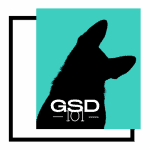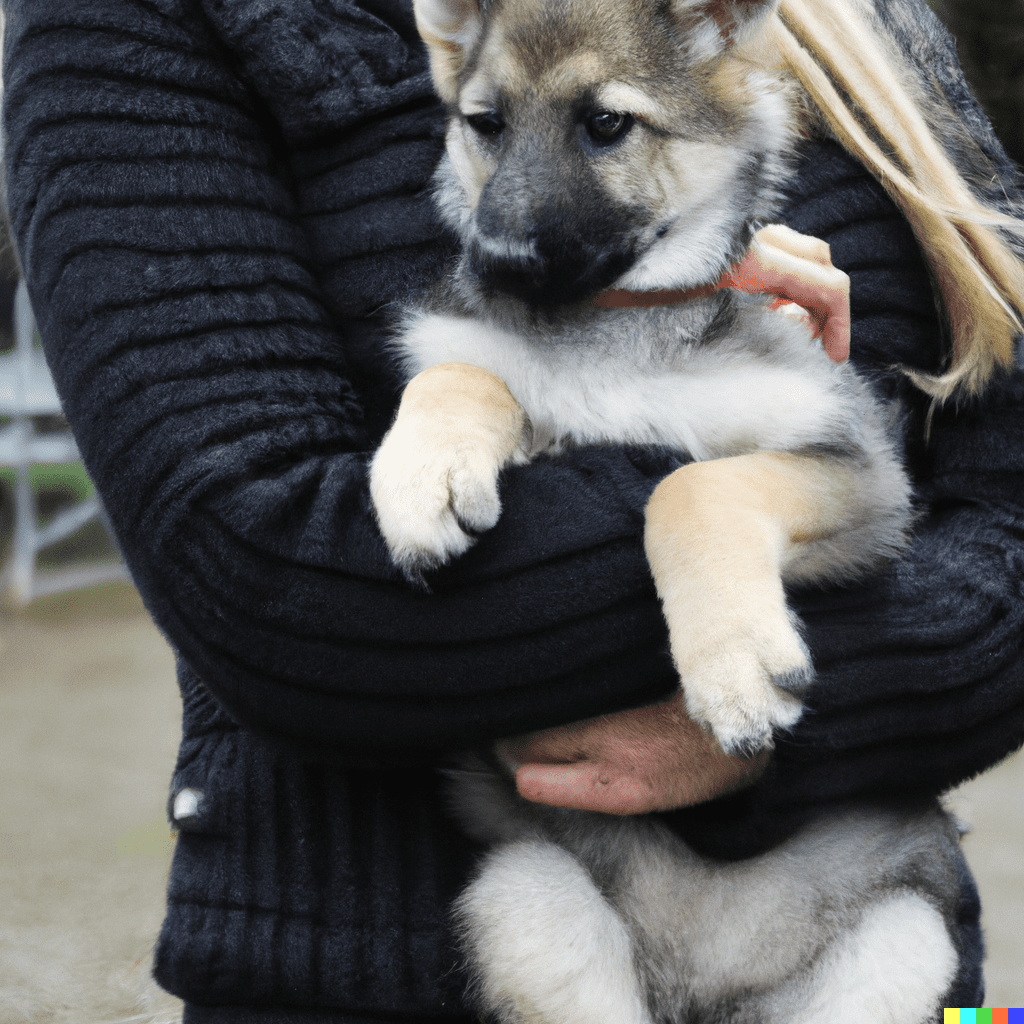Disclosure: This post contains affiliate links. We may earn a small commission if you decided to make a purchase, at no additional cost to you.
If you have a 3-month-old puppy, you may be concerned about all the nutrients they need to have. Fortunately, it is not that complicated, and you can confidently make decisions with a few guidelines.
A three-month-old German Shepherd puppy should have between 2000-2200 kcal for a day. That amounts to 1.5-2.5 cups of kibble fed three times a day. The protein content should be at 22% and the fat at 8%. Mealtime should last no more than 15 minutes.
Feeding a 3-month-old German Shepherd puppy can be easy and fun. Understanding how to feed them and ensuring proper nutrition will lead to a long and healthy life.
More on feeding your German Shepherds
The Best Food For German Shepherd Puppies: A Beginner’s Guide
The Best Dog Food for a 12 Months German Shepherd
How Much Does an 8-Week-Old German Shepherd Puppy Eat in a Day?
How Much Does a 3-Month-Old German Shepherd Dog Eat in a Day?
How Much Does a 6-Month-Old German Shepherd Dog Eat in a Day?
How Much Does It Cost to Feed a German Shepherd Puppy in the First Year?
Size and appearance: What’s going on with a 3-month-old German Shepherd puppy?
A 3-month-old German Shepherd puppy is the cutest goofball you cannot stop falling in love with. They are playful, mouthful, and full of energy. And most importantly, they are still growing rapidly.
The weight and size
A puppy’s weight will largely depend on the diet you feed them with. Males can weigh 22-30 pounds (10-13 kg), while females weigh 17-26 pounds (8-12 kg). Their height will be about 9-11 inches (23-28 cm). and 8-10 inches (20-25 cm) respectively. The gender difference is starting to become apparent at this age.
Owner’s nightmare: Teething stage begins
At this age, your pup will go through teething where their adult teeth growth starts. It can also be a brutal stage for owners alike as your pup tends to nip and bite a lot. Teething will last for a few months until all the puppy teeth will be replaced.
The Appearance
The fluffy appearance will gradually disappear as they develop the double coat, where the inner layer is soft and dense and the outer layer is thicker.
Your pup’s ears are mostly floppy but they can stand up and goes down from time to time. This is because teething is sucking up a lot of calcium, and the ear cartilage cannot strengthen properly.
Watch this video where a 3-month-old GSD shows off you all the tricks he’s learned:
3-month-old German Shepherd puppy feeding guide
Here are some things to consider when feeding your 3-month-old GSD puppy. How much food should they get at a time, and how often in a day? Food should also only be left out for specific amounts of time.
| Feeding guide for a 3-month-old German Shepherd Puppy (per day) | |
|---|---|
| Calories | 2000 and 2200 kcal |
| Feeding Amounts | 1.5-2.5 cups of kibble per meal, depending on the weight |
| Feeding times | 3 times |
| Mealtime Length | 15 minutes max. |
Calories need (2000-2200 kcal per day)
It is important that puppies replace the calories they are using. Three-month-old puppies should be fed between 2000 and 2200 kcal a day.
Feeding amounts (1.5-2.5 cups per meal)
Portioning food is essential for dogs. Feeding correct amounts will help keep them on a good schedule and encourage good eating habits. On average, a 3-month-old puppy will need between 1.5 and 2.5 cups. You can also check your food label for feeding guidelines.
Feeding frequency (3 times a day)
A 3-month-old GSD puppy should get fed three times a day. Providing them with portions multiple times a day helps to maintain good digestion. Establishing a good schedule around eating a few times a day is excellent and can help with training. Create a plan that you can be consistent in doing.
Mealtime length (15 minutes max.)
Food should not be left out all the time, even if they did not eat it. Removing the food after its being left out for 15 minutes. This will help to limit them from becoming picky eaters or not finishing their meals when they can. It will also encourage your pup to eat multiple times a day when it is available.
Nutrition requirements for a 3-month-old German Shepherd puppy’s growth
At three months old german shepherd puppies are just starting to eat regular food. It is a necessary time to make sure they are getting proper nutrition. Feeding them well at three months will help them grow strong muscles and healthy teeth. They will also have healthy skin and a shiny coat.
Protein
Puppies should be getting 22% protein. Protein is an essential nutrient that has many benefits for growing puppies! It gives them optimum muscle development and can help to repair muscle tissues. It helps to promote a healthy coat and skin as well.
Fat
Another essential nutrient is fat, and puppies should get 8%. Fats also play a role in your dog having healthy skin and coat. Fat will also help your puppy to absorb other vitamins and minerals. Excessive fat can cause digestion upset, but in the right amount, it is a vital part of their diet.
Carbohydrates
There is no set amount of carbohydrates a puppy should have, but it needs to be in their diet. Carbohydrates are essential as they are an energy source. They are also a great source of dietary fiber for your dog.
Other essential nutrients (e.g., vegetables, fruits, minerals, and vitamins)
A diverse diet will help your GSD puppy to get all the vital nutrients they need. Meat is essential and should be the primary protein source, but fruits and vegetables are also necessary. Minerals such as calcium and phosphorus help to support bone health. Vitamins like Vitamin A help to support the immune system.
How much should a 3-month-old German Shepherd puppy eat in a day?
There are some factors to consider when determining how much to feed your GSD puppy. Activity, age, and health are all considerations that can impact how much you should feed your dog.
Activity
If a dog burns a lot of calories through activity, they need the calories to compensate for that. A puppy can be very active, and they need to replace that lost energy with calories.
Age
A 3-month-old puppy will need more calories per pound compared to an adult German Shepherd. This is why food for puppies will usually have more calories per cup. Puppies need more calories because of their activity level and how much they are growing.
| GSD Age | Number of feedings per day | Average calories per day | Total cups of kibbles per day |
| 0 to 12 weeks | 4 | 1200 – 2400 calories | 1 – 2 cups |
| 3 to 6-months | 3 | 2000 – 2200 calories | 1.5 – 2.5 cups |
| 6 to 12 months | 3 | 2700 – 3900 calories | 2 – 3.5 cups |
| 12 to 18 months | 2 | 3300 – 4250 calories | 3.5 – 4.5 cups |
Health
Take into consideration whether your puppy is underweight or overweight. A skinny puppy may be malnourished and lack energy. An overweight dog may be susceptible to hip dysplasia or arthritis. Feeding amount can vary based on your pup’s current health.
What to feed a 3-month-old German Shepherd puppy?
Deciding what you would like to feed your puppy can be confusing. There is kibble, raw food diet, and homemade recipes. Each has pros and cons, which we will explore in the list below.
1. Feeding a German Shepherd Puppy kibble
Kibble is dry food that is often commercially produced. You have many different brands and options available. Most brands will include every essential vitamin and nutrient necessary, so it is a good choice for long-term use.
| Pros • Convenient with a long shelf life • Contains all the needed nutrients • Can help keep teeth clean | Cons • Typically highly processed • Low moisture |
Suggested feeding amount per day: 1.5 – 2.5
Averaged cost per month: $50
Who is this for? Kibble is for somebody who wants the convenience and guarantee of nutrients for their puppy.
2. Feeding a German Shepherd Puppy a raw diet
A raw food diet is not only uncooked meat but vegetables and fruits too. Some concern if fed long term is an unbalanced diet that can lead to deficiencies. Another thing to consider is the possible human or animal exposure to bacteria in raw foods.
| Pros • More like a natural diet • High quality that you choose • Avoid allergens your pet may have | Cons • Bacterial risks • Time-consuming to prepare • Easily be an unbalanced diet |
Suggested feeding amount per day: 1 pound of food
Averaged cost per month: $120
Who is this for? A raw food diet can be an excellent option for somebody willing to ensure balanced meals and not too concerned with possible bacteria contaminants.
3. Feeding a German Shepherd Puppy a homemade diet
A homemade diet is when you would prepare your dog’s food. This is similar to the raw food diet, just different food preparations. This can also become unbalanced; recipes need attention to ensure your puppy gets everything they need.
| Pros • You control all ingredients • Can offer fewer preservatives • Feed fussy eaters | Cons • Legitimate recipes difficult to find • Time-consuming to prepare food • Can be unbalanced |
Suggested feeding amount per day: 1 pound
Averaged cost per month: $65
Who is this for? Homemade recipes can be great for owners of fussy eaters or those with numerous allergies.
Is my German Shepherd puppy the right weight?
How do you know if your puppy is the proper weight? General guidelines suggest that a 3-month-old German Shepherd puppy will be 22-30 pounds. Dogs can get weighed on any scale to check their weight.
Looking at your dog can also help you see if they are at the right weight or not. If you cannot feel your dog’s ribs, they may have too much fat and be overweight. They may be underweight if you can see and feel their ribs easily.
Feeding treats to a German Shepherd: Things to consider
Treats are a great training tool, especially during those puppy years. They should be in moderation and make up no more than 10% of your dog’s daily calories. You can make homemade treats or purchase from many different kinds at the store.
You can make treats tailored to what your dog likes. If they love chicken, either buying chicken-based treats are making your own is excellent. They are a great motivation during training and should be used wisely.
Should you give Your German Shepherd supplements?
You can give your GSD puppy supplements but do not have to unless otherwise informed by a veterinarian. This depends a lot on their diet. If you give them an appropriate commercial diet, all their nutrients are included. If given a different diet, they may need those supplements to compensate for missing something.
Supplements like fish oil and multivitamins can be perfect for your dog. However, it is unnecessary if they already get all their nutrients from food.
Water intake for a 3-month-old German Shepherd puppy
Having water available is very important for dogs of all ages. Puppies will need approximately ½ cup of water every two hours. This general guideline can be hard to measure, so don’t worry too much.
Dehydration is terrible, and knowing what signs to look for can help you to act quickly. Some things to look for are loss of appetite, dry nose, and sunken or dry-looking eyes. Dehydration comes from a lack of water.
Final thoughts
Feeding a puppy can be a daunting task. Hopefully, this article has helped you decide what you will feed your 3-month-old German Shepherd. Many nutrition requirements need to be met. You can also make many choices based on what works best for you!

Further Questions
Why is my German Shepherd puppy always hungry?
Puppies are growing a lot and very quickly! They need the calories to match all the energy and growth.
What to do if my German Shepherd puppy won’t eat?
A German Shepherd may stop eating for many reasons. You can read this post for great insight and tips to get them eating again!
When should I switch my German Shepherd puppy to adult food?
Puppies should stay on puppy food for 12-18 months. Make sure when switching that you transition to adult food gradually.
More posts on feeding your German Shepherds

Must read:
- The Best & Worst Dog Foods Ever – According to a 45-Year Veterinarian
- Worst Dog Food for German Shepherds
- Is Grain-Free Good for German Shepherds?
- How to Stop Food Aggression Towards People in German Shepherds?
Choosing the best dog food:
- The Best Food For German Shepherd Puppies
- Best Cheap Dog Food for German Shepherds (Dry and Wet Food)
- Best Dry Dog Food for Your German Shepherd Puppies: How to Choose?
- The Best Dog Food for a 12 Months German Shepherd
- What To Look For When Buying Dog Food for German Shepherds?
- Is Royal Canin German Shepherd Dog Food Any Good? Read This First
On feeding your German Shepherd:
- How Much Does It Cost to Feed a German Shepherd Puppy in the First Year?
- How Much Does an 8-Week-Old German Shepherd Puppy Eat in a Day? A Feeding Guide
- How Much Does a 3-Month-Old German Shepherd Dog Eat in a Day? A Feeding Guide
- How Much Does a 6-Month-Old German Shepherd Dog Eat in a Day? A Feeding Guide
- Can Dogs Eat Vanilla Ice Cream?
- 17 Human Foods That Are Safe For German Shepherds to Eat
- The Benefits of Feeding German Shepherds Raw Food
- How to Feed Your Dog Raw Food on a Budget?
- Is It Ok to Give Raw Meat to My German Shepherd Puppy?
For picky eaters:

Hayley is a writer and animal lover. She is an avid reader which led to a love of writing.



